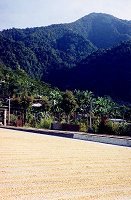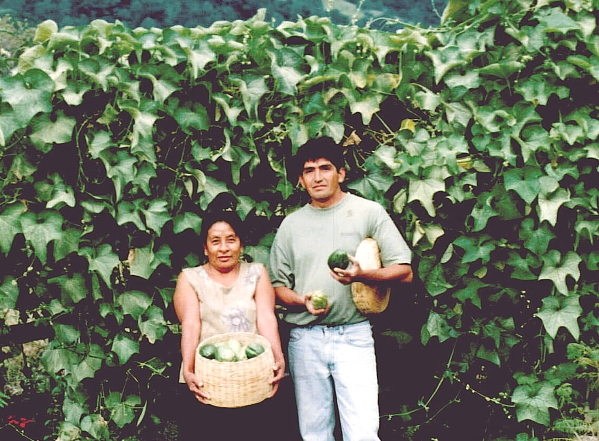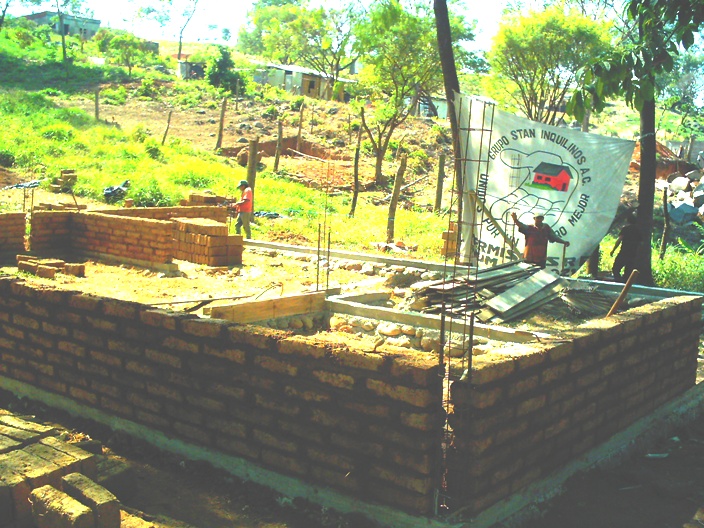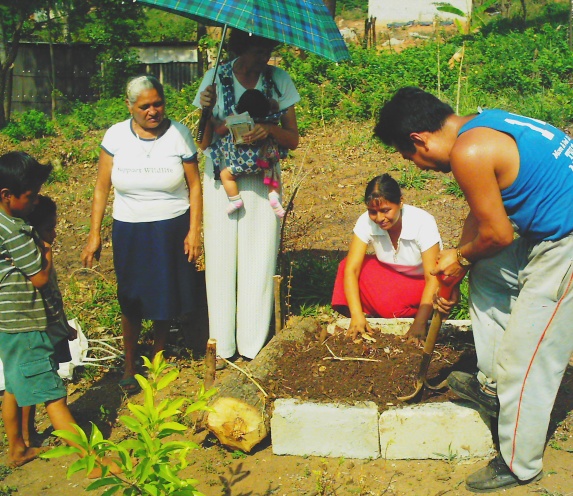# Eco-Villages: Helping people create sustainable communities

Ecovillages are communities where people have joined under a common purpose to create an environmentally sustainable living space where all members can enjoy a healthy quality of life. Around the world, once impoverished people are raising their standard of living by organizing their villages and communities such that there is greater economic, social and environmental stability. By establishing systems that give them local control of food production, energy production and resource management, life comes easier in many ways. People no longer have to spend money to buy food or pay for energy and water and their time is freed from drudgery like collecting firewood for cooking fuel. These improvements especially benefit women who can now devote themselves to more productive endeavors.
In general the eco-village model views a community as an integrated system in which every effort is made to maximize productivity of the land, and to regenerate the natural areas in which the community exists. Food is produced locally using organic methods and permaculture, thus insuring good nutrition year round for all. Community members work together to manage their resources. Rainwater is collected from roofs and catchment dams. People work together to reduce, recycle and otherwise manage waste including water that becomes contaminated from normal use. Buildings are designed to be low impact with a priority being given to the use of locally available materials. Strategies are used to produce energy on site whenever possible. So, as you can imagine, an eco-village is a place of continuous experimentation, innovation and energy as people implement new ways to live better with less impact on the natural world
Eco-villages also provide the benefits that come with living in a cohesive group of people all dedicated to constinuously improving the quality of their community. Life is always better where people practice reciprocity, mutual aid and share a common purpose.
# We would appreciate hearing your stories of what has worked for intentional communities as well as plans for appropriate technology projects that would be useful for the communities we work with. Please send to tamara@sextosol.org.
# Projects to date:
# Asociación de Campesinos Nuevo Bullaj

As part of our on-going work with the Asociacion de Campesinos Nuevo Bullaj, we have been providing training on how to grow food organically with permaculture and more. In September, 2010, thanks to a grant from the San Francisco Marin Jewish Community Foundation's Teen Foundation, we began a long term project of assisting the community of former refugees to transform the community they've created into a sustainable eco-village. Over two weeks we provided training sessions with the whole community, the women's group, and in the schools to introduce the principals and methods of ecovillage living and sustainable food production.
# Photo: Coffee drying at Nuevo Bullaj, Guatemala
We will return in the Spring, accompanied by volunteers knowledgeable in permaculture design, to help each family establish food gardens, beautify the grounds, and plant communal orchards. As a part of this work, Sexto Sol continues to assist the community with preparing their to receive guests. The hotel will provide a cooperative second business for the coffee-producing community which will provide much needed jobs. Sexto Sol has assisted these people since they were in exile. For years Sexto Sol has helped them successfully export their coffee. (opens new window)A community nearby has asked us to help them plant fruit trees to improve the quality of their diets. Please consider making a contribution to make this possible in early 2011.
Volunteers with permaculture design experience or other useful skills, please contact tamara@sextosol.org.
# Grupo Stan Inquilinos:
In the aftermath of Hurricane Stan, 1000 families began the work of creating a community in the rainforest on the hot coastal lowlands bordering the Sierra Madre mountains. After receiving an intensive introduction to permaculture at Sexto Sol's Escuela de Agroecología y Permacultura Tierra Linda (opens new window), the directors of the Grupo Stan organization asked us to help them to develop and implement plans leading to their creating an intentional community. Sexto Sol helped the community move forward with bi-monthly workshops and on-site training. Sexto Sol's work was featured in a documentary on eco-villages.
# Construction of green-office and education center; Tamara supervising first home garden
Program Coordinator Francisco Barrios designed and supervised the building of a green office and learning center on the site. We provided technical training in rainwater harvesting and helped them identify much-needed strategies to recharge groundwater to replenish the dried up well. We provided workshops on how to grow food gardens around their homes. In addition to this technical training, we focused on helping the people to develop the knowledge and attitudes needed to successfully create an intentional community. This included doing consciousness raising to awaken the ideals of the "common good" and respect for the environment as necessary guiding principals that would lead them to create a peaceful and sustainable community where everyone thrives.
# Our work is made possible by the financial support of people like you


 The Sexto Sol Center
The Sexto Sol Center 

